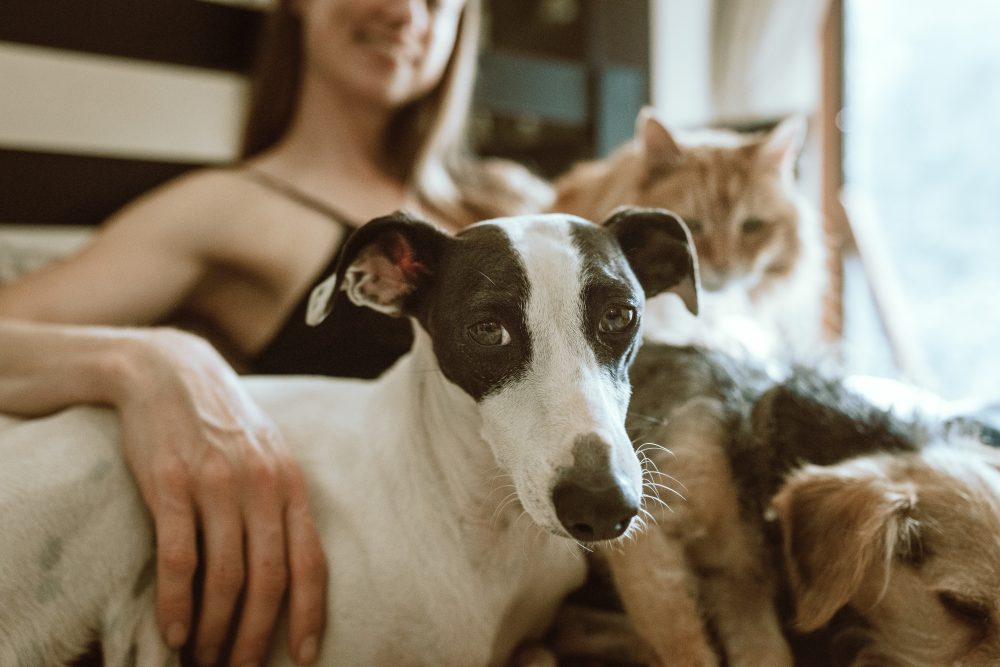How to Keep Your Pets Safe During Fireworks
In the lead-up to Bonfire Night, Diwali, New Year’s Eve, and other events where fireworks may be set off in celebration, we asked one of our veterinarians, Dr Ben Howitt, how we can help our pets cope with loud noises and bright lights, and keep them safe.
Whilst fireworks represent celebration and community, they also are a serious source of fear and distress in many animals and are a significant concern for animal welfare charities. They can affect an animal’s behaviour, often making them react hastily and unpredictably, or to seek shelter and security. This not only puts the animal under psychological stress, but these fear responses can result in them doing unintentional harm to themselves.

Credit: Alex Jones, Unsplash
According to a study at the University of Bristol in 2013, 45% of dogs show fear responses towards the sound of fireworks, and on average the RSPCA receives over 400 calls a year from public concerns over animal welfare regarding fireworks in England and Wales.

Credit: Sandra Seitamaa, Unsplash
Having a broader understanding of the fear response, what to anticipate, and how you may be able to manage it, will provide you with the ability to take control of the situation and help your pet feel calm, safe, and secure.
How Can I Tell if My Dog is Afraid?
Each dog has their own character and personality, and therefore their fear response to fireworks may present as a wide variety of different physical symptoms. Here are a few signs to look out for:
Full-body shaking or trembling
Whining or vocalising
Hiding under furniture
Demanding attention and permanently at your side
Restlessness and pacing
Urinating or defecating inappropriately
Attempting to get out of the property or run away
Chewing or biting objects such as shoes or carpets

Credit: Nick Mundackal, Unsplash
Anxious episodes in animals are not dissimilar to humans, and these fear responses are a natural response to a perceived threat. Therefore, behaviours that the animal may never have demonstrated before may arise unexpectedly, in some instances they may snap or bite if they feel that they are being threatened. Keep reading to learn how you can help avoid these instances.
7 Ways to Prepare Your Pet for Fireworks
If your dog or cat has shown any signs of fear from fireworks in the past, or you have a new pet and this will be their first experience, it is important to prepare for the night.

Credit: Biel Morro, Unsplash
Here are a few tips to consider before the evening:
Create a Safe Environment: Build an area/den/hiding space in a common area that will make them feel safe. This can be in the corner of a room or in a crate, a space where there is only one entrance and a roof to help the animal feel as secure as possible. Pack it with blankets or bedding so that they can retreat to that space. You may even build more than one if you know of the places they like to sleep or hide already.
Secure Your Home: Ensure that windows and doors are closed securely and that there is no route for them to escape (or even hurt themselves trying to).
Walk Them Early: Walk your dog during the day and well before any events take place.
Feed Them Early: The stress induced from fireworks will dampen any form of appetite.
Microchip Your Pet: As an extra bit of security, it is worth having your pet’s microchipped and ensuring that the details on the microchip are up-to-date on the register, e.g. phone numbers and addresses. Then, if your pet does escape, any member of the public will be able to bring them into a shelter or veterinary practice who will then have the means to contact you swiftly.
Use Calming Products: There are plenty of products on the market that are aimed at easing anxiety in your pets, such as plug-in diffusers or body rugs. Please seek the advice of your veterinarian as to which products may be most appropriate to your animal’s specific needs.
Seek Veterinary Advice: In cases where your dog’s fear responses are concerning, or particularly where they have caused themselves harm in the past, then it is best to seek your veterinarian’s advice well in advance to help ease any anticipated anxiety episode.
4 Things You Can Do For Your Pet During Fireworks
The event can be stressful for both pets and owners. It’s important not to accentuate a negative experience, and provide your beloved pet with the right support.

Credit: Chewy Tum, Unsplash
Here are a few things you can do to help minimise your pet's stress levels when fireworks are going off.
Remain at Home: Stay close when the evening starts or ensure that your pet knows where you are in the house so that they can easily find you.
Create Distractions: Close the curtains, turn on the lights, and put the TV or radio on to help muffle any sounds or dampen any bright lights. You may also try providing them with a chew or similar form of enrichment to help distract them.
Accept Their Reactions: Your pet needs to be in control of their own reactions during anxious episodes, so do not try to encourage them to do what you feel is best.
Allow them to retreat and choose their own hiding space.
Do not lock them in their crates or confine them to one room.
If they settle in a hiding place, don’t try and encourage them out of it. You can provide positive reassurance but accept that if they have retreated to a safe place, they may not want to be bothered or touched too much, and they will be happy just knowing that you are around.
Do not restrain them.
If they seek your attention, provide physical reassurance as you would normally.
Stay Calm: Dogs will easily be able to read your anxiety. Try not to panic yourself and remain with them calmly to provide reassurance.

Credit: Eric Ward, Unsplash
With all of these tips, the most important one of all is to understand your pet. Every animal’s reaction will be different and represent a part of its personality. Predicting their fear responses comes in time as your relationships with them develops and grows stronger.
Hear More From Us
Read the latest news from our veterinary teams around the world, or subscribe to keep up-to-date with our projects, hear how your support is helping, and find out ways to get involved.